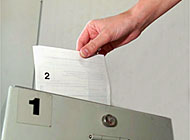Foreigners in Jura prepare to stand in groundbreaking election

Canton Jura is making Swiss electoral history this weekend. For the first time, foreigners are being allowed to stand for elected office.
The tiny French-speaking canton in the far northwestern corner of Switzerland broke new ground in 1979, when it allowed foreigners who had lived in Switzerland for more than 10 years to vote in communal and cantonal elections.
Now it has gone a step further. Twenty foreigners are seeking election to local councils in towns such as Delémont, Porrentruy, Bassecourt and Bois.
However, before local people approved the move last May, some deep suspicions had to be overcome. They had already rejected the notion of electing foreigners in a referendum in 1996.
But Jura, the youngest Swiss canton, is still way ahead of the rest of the country. In September, amid much fanfare, Neuchatel voted to give foreigners who have lived in Switzerland for five years the right to vote in local elections.
Other cantons, like Geneva and Vaud, are also considering granting such civic rights to foreigners. However, most Swiss cantons still baulk at the idea.
The 13 men and seven women contesting the elections in Jura come from every walk of life. They include locksmiths, car mechanics, students and entrepreneurs, and are representing parties right across the political spectrum.
And there is a good chance that some of them will get elected. Seven are standing in Delémont, where 124 candidates are vying for a place in the 51-seat town council. Six are among the 130 people chasing the 41 seats available in Porrentruy.
“It’s a great opportunity for us foreigners to be involved. I jumped at the chance,” says Luigi Viesti, standing in Bassecourt for the Independent Social Christian Party.
Of the 20 foreign candidates, 12 are Italian, three Spanish, three French and one Portuguese. Only a tiny minority of them were born in Switzerland, the vast majority having come here as immigrants.
“I am a citizen of Europe and a citizen of the world. People should be elected according to where they live, not where they were born,” says Raphael Scarciglia, an Italian plumber representing the Social Democrats.
“First and foremost, though, I am a citizen of Delémont. It annoys me when people point out that I am foreign. I have lived here for 30 years. If I’m elected I will be representing the people of Delémont,” Scarciglia told swissinfo.
But others realise that if they are elected, they will have the added responsibility of being figureheads. Luigi Viesti acknowledges that he will have a mandate to speak for all the people of Bassecourt. “But I’m happy to be a spokesman for the Italian community. I want them to have less to complain about than before,” he told Swissinfo.
The canton may have given foreign nationals the right to stand for election, but that does not mean that the people of Jura will choose them.
“There are some people who will not vote for a foreigner,” says Scarciglia. “But that is their right in a democracy.”
Luigi Viesti says the opposite is also true: “There are a lot of people who’ve told me they are going to vote for me because I am foreign. A lot of people who were reticent about voting in the past are now ready to participate.”
Most of the foreign candidates say they have had little trouble fitting in in this corner of Switzerland, although they are also very aware of where they come from.
“I’ve made a real effort to integrate, and I’ve largely been accepted,” says Francisca Moreno-Angulo, a Spaniard standing for the Social Democrats in Porrentruy. “But there’s always something to remind you that you are foreign.
“It’s only fair that we who have been working and paying taxes here for 30 years can stand for election. But I don’t think these new rights are going to change things drastically,” she says.
Moves to give foreigners the vote are part of a cantonal project entitled “Open Land”. It is aimed at improving integration, but also of making the canton more attractive to outsiders and boosting its population, which currently stands at 69,000. The authorities are hoping that that will rise to 80,000 by 2020.
The head of the Open Land, Yann Barth, says that while the election of foreigners is not actually part of his project, it is being used as a way of attracting people to the canton.
Barth also believes that the Jura is more advanced that other cantons in terms of integration because of its geographic position and because of its struggle for autonomy.
“To a certain extent, the people of the Jura distrust the Swiss. They have a frontier mentality and look as much to France and Germany as Switzerland. We have a greater openness towards foreigners,” Barth told swissinfo.
by Roy Probert

In compliance with the JTI standards
More: SWI swissinfo.ch certified by the Journalism Trust Initiative
You can find an overview of ongoing debates with our journalists here. Please join us!
If you want to start a conversation about a topic raised in this article or want to report factual errors, email us at english@swissinfo.ch.